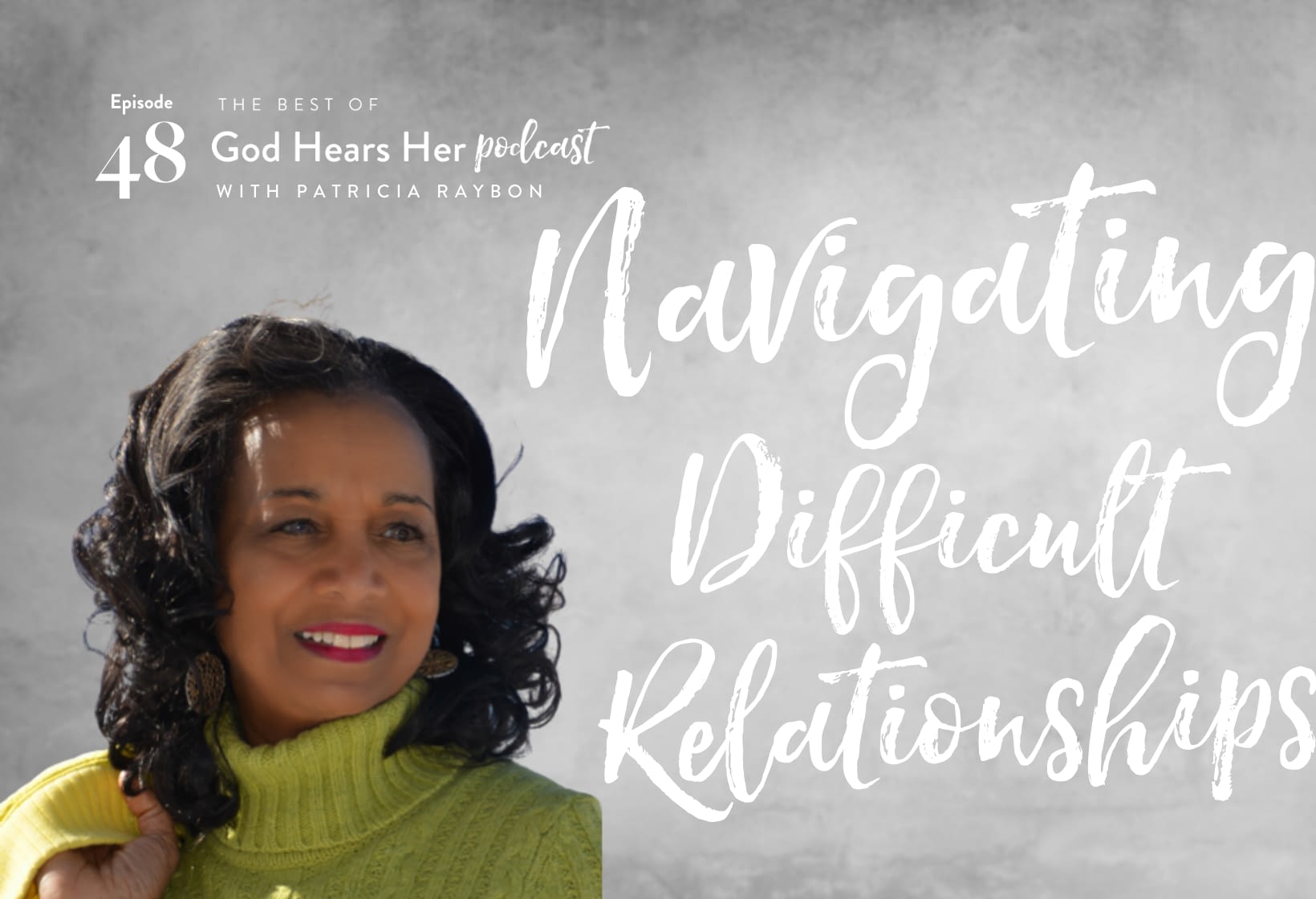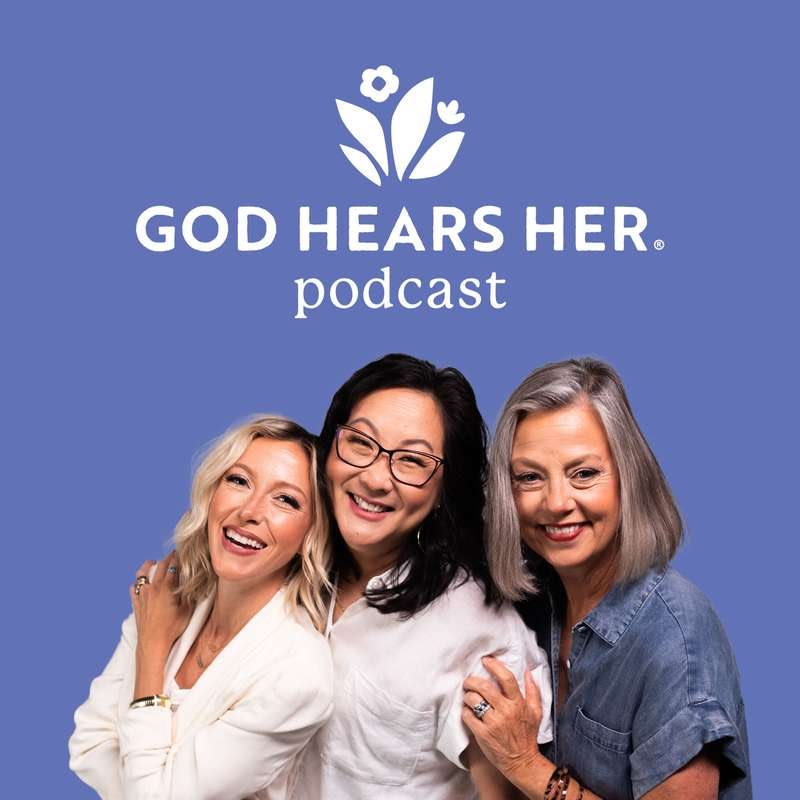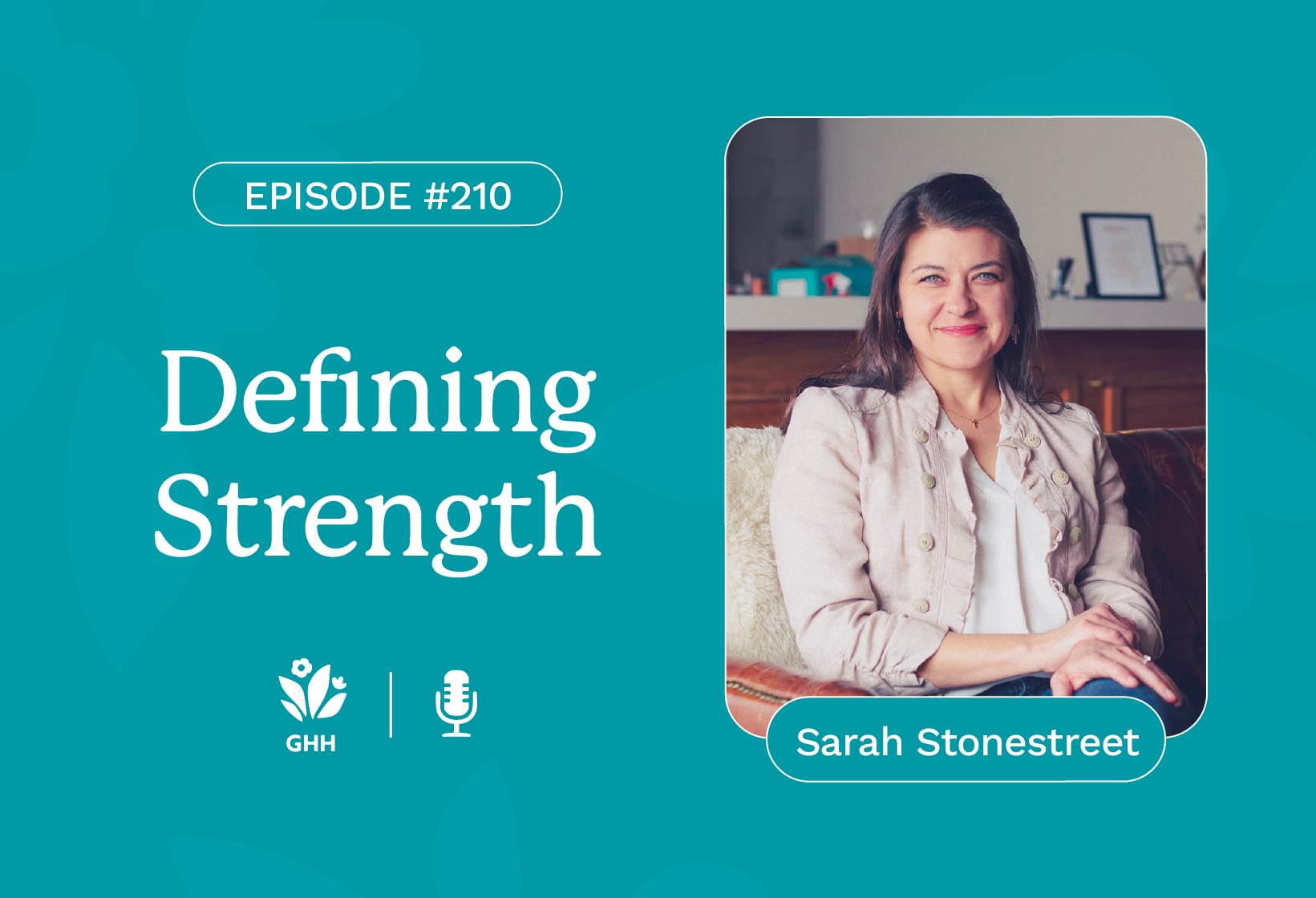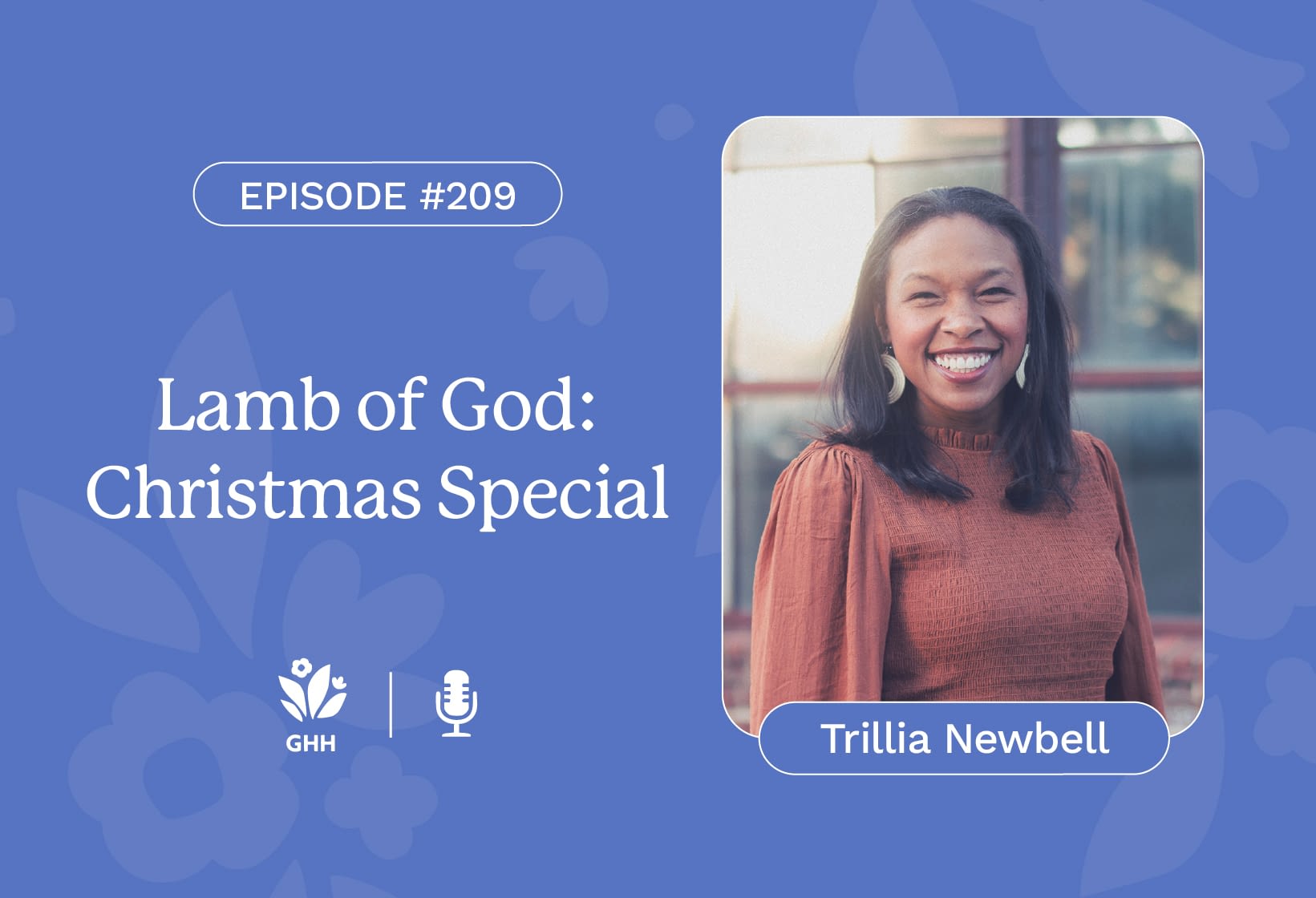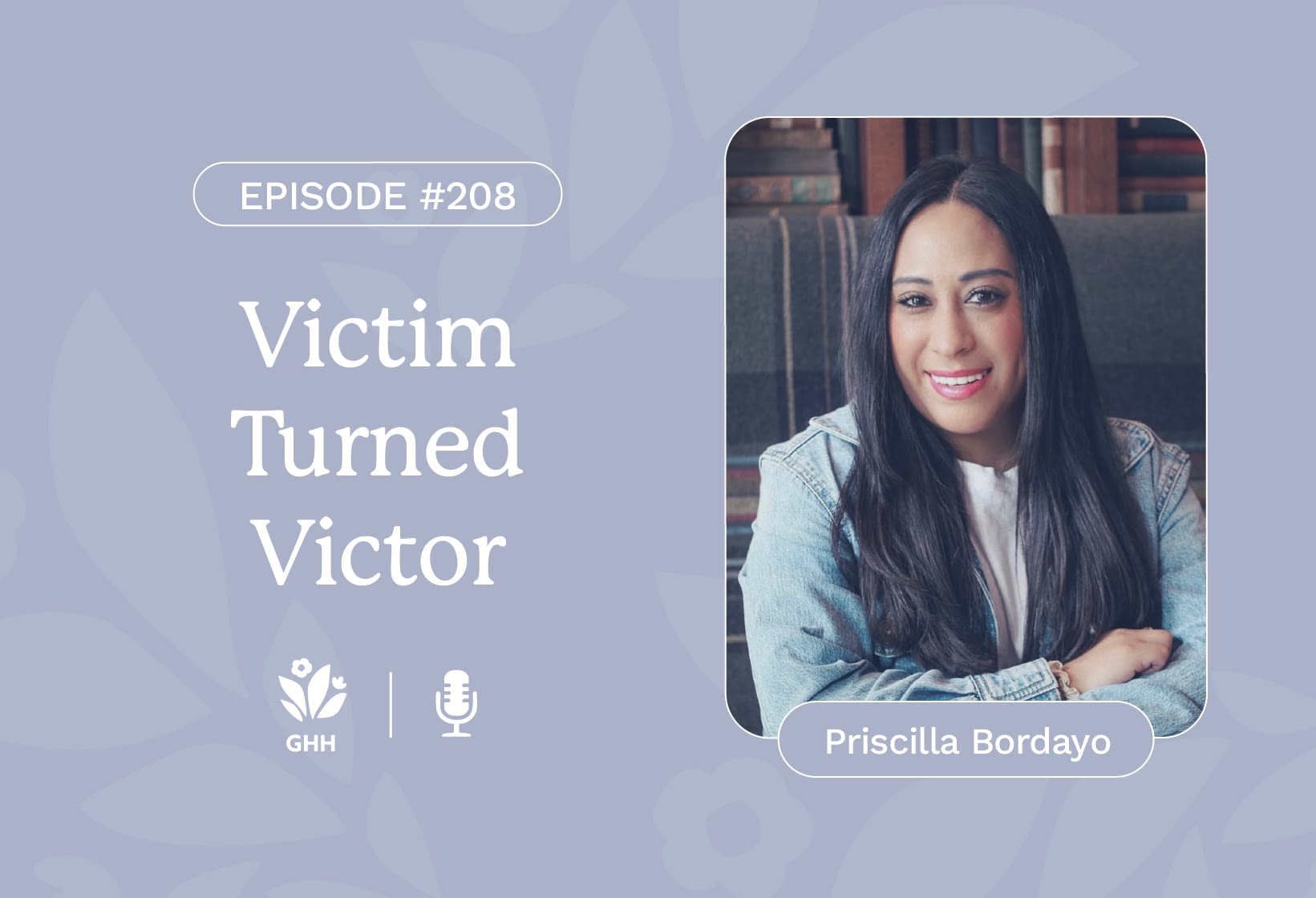The Best of God Hears Her Podcast – Navigating Difficult Relationships
About this Episode
Episode Summary
How do you navigate difficult relationships? How do you handle deep disagreements with people you love? What does it look like to deal with conflict when the person you’re at odds with is a family member or a close friend? On this “best of” episode of God Hears Her, Eryn and Elisa revisit a previous conversation with Patricia Raybon as she shares her story of navigating a complicated relationship and offers practical wisdom for those of us who may find ourselves in a similar situation.
Episode Transcript
God Hears Her Podcast
Episode 48 – The Best of God Hears Her – Navigating Difficult Relationships
Elisa Morgan and Eryn Eddy with Patricia Raybon
Patricia: I have encountered families during this season who shun their children who have chosen a different lifestyle or who are on a different walk. The thinking being that that kind of tough love is going to turn it around. I don’t condemn that, because we don’t know all the ins and outs of other people’s stories. But I do know based on how the Lord has wired me, that graciously He said you want to love, so love her and trust Me. And so we’re able then to still be a family even though the details of our conflict have not been resolved.
[musical interlude] You’re listening to God Hears Her. A podcast for women where we explore the stunning truth that God hears you. He sees you, and He loves you because you are His. Find out how these realities free you today on God Hears Her.
Elisa: Welcome to God Hears Her. I’m Elisa Morgan.
Eryn: And I’m Eryn Eddy. And today we want to revisit a conversation from Season 2 on Navigating Difficult Relationships. Because let’s be real. We’ve all experienced deep disagreements with people we love. Maybe you’re in the midst of one right now. Well what does it look like to deal with conflict when the person you’re at odds with is a family member or a close friend? What does it look like to try and find a way forward when a way forward seems impossible? Let’s revisit our discussion with Patricia Raybon as she shares her story of navigating a complicated relationship and offers practical wisdom for those of us who may find ourselves in a similar situation.
Elisa: But first, some words on Patricia. Patricia Raybon is an award-winning author and journalist and a writer for both Our Daily Bread and Dayspring’s Encourage blog. She guides people into conversations on faith and race and grace. And she lives out her practical wisdom through relationships with people from different ethnic and faith backgrounds. Her most recent book is titled Undivided: A Muslim Daughter, Her Christian Mother, Their Path to Peace. So let’s get into our conversation with Patricia Raybon. This is God Hears Her.
Patricia: Race relations still confuses, worries, angers, divides people. And I, in one part of me, feel a little bit heartbroken that we’re still in that place. But you know what? As I look at history, there’s never been a time when people were not divided by differences and by ethnicities. And so a book that I thought would just have a season is “Evergreen.”
Elisa: It is.
Eryn: Yeah.
Patricia: Because we are always wrestling with our differences. Sometimes they’re ethnic. But one thing I read after writing that book is that a lot of people read it not because they were having racial issues they were struggling with but because they were having issues in their own families. And they needed to know how to bridge those divides. I remember a man telling me that, after reading My First White Friend, that he was inspired to reach out to a brother he hadn’t spoken to in five years—a sibling. Writing it, I just never imagined that it would find a utility in that kind of tension. But people struggle to get along.
Eryn: Yeah.
Elisa: Yeah, me too.
Eryn: They really do.
Elisa: We all do, and…
Eryn: Yeah.
Elisa: …I find it ironic, Patricia, having known you from a distance many decades ago and then knowing you a bit closer in proximity over the last five-eight years or so. We serve on a board. But it’s fascinating to me, ironic, and can we even say providential, that the topic that attracted you to your first book is one that God brought home into your own family, the topic of how do we get along with differences?
Patricia: Yes. You know God knows what God is doing. That book is called My First White Friend. My younger daughter married someone who’s white. And so the work of that book became not just academic, but it became part of what was going on at my kitchen table. And so I never imagined that that book would prepare me in that way to have an interracial family.
Eryn: Wow.
Patricia: But I do. And my son-in-law is my son. A day hardly goes by when I don’t tell my husband Dan how grateful I am for Paul. And this sounds a little selfish. He’s a great cook.
Elisa: That’s awesome.
Patricia: But and when he cooks, he’ll always very often give us a buzz and say if you haven’t fixed dinner today, I just made tacos and tamales and this and that and chips and queso.
Elisa: Okay, I’m down.
Eryn: [inaudible] sign me up for that.
Patricia: Right.
Eryn: What did that book and that process of writing it and just being very vulnerable with your feelings in the book, what did it teach you?
Patricia: It taught me that our stories are not our own. I share a lot of a writer of memoir. And my daughters…Eryn used to say to me, “Mom, how can you tell these personal stories?” But what I discovered is they really are not mine. They give the people who read them permission to reflect on their own lives. I didn’t know that when I wrote that book. But almost immediately when you know I began to get feedback from it, people would say “Thank you for your book. I really enjoyed it.” And then next sentence, “It reminds me of my life.” And then two or three pages on their journey.
Eryn: Wow.
Patricia: Things happened to me, but I can share that and let that go, and put that out into the world as a way of helping or inspiring or teaching others. And so…
Elisa: It’s a way of stewarding.
Patricia: Yes.
Elisa: Isn’t it? Of experiences.
Patricia: Yes.
Elisa: Some are happy, and some are really painful.
Patricia: And universal. And so everybody’s trying to do the same thing, you know, put food on the table, raise children, relate to spouses and offspring and siblings. And when we share what we’ve been taught in our own humble circumstances, the Lord just is able to do great things if we’ll let it go.
Eryn: How do we let it go?
Patricia: Trust the Lord that what the Lord does with it will bless others.
Elisa: I think there’s an investment of vulnerability too though, Patricia. Because you write in a memoire genre which means sharing first person from your own experiences. And that’s a great and exorbitant cost to an author to reveal in that way. The theme that, in my heart threads through and this is just my little tiny peephole into your writing, but my peephole is you do have this theme of differences—differences in people, differences in skin color, differences in cultures, differences in faith, differences. And you know we said it’s ironic that the topic of My First White Friend that you wrote from your growing up years as a young, young girl and then woman and then your family becomes one that is bi-racial through marriage of your daughter, another difference appeared with another one of your daughters. And this difference is a bit more recent. Can you tell us about that one?
Patricia: My younger daughter who left the faith. I’m a lover of Christ and sold out for Jesus…
Elisa: You are.
Patricia: …and have grace…my daughter’s in the faith. And our younger daughter, right before 9/11, left the faith and converted to Islam.
Elisa: Whoa.
Patricia: And she’s actually the one whose husband also is white.
Elisa: That’s right.
Patricia: He did the same thing…was raised as a follower of Christ and left the faith. And that’s why they were introduced. Their mutual friends knew their stories and introduced them. Did I see that coming? No, I didn’t.
Elisa: How did that hit you, Patricia? How did…
Patricia: Ton of bricks.
Elisa: Uh huh, uh huh.
Patricia: Is that an idiom that people still use?
Eryn: Yes.
Elisa: I think so.
Patricia: A ton of bricks. I’m smiling today. But we had 10 long years of arguing and tension.
Eryn: I’m sure.
Patricia: It was a hard place to be in.
Elisa: And how…what kind of conflict…how did that…how’d it show itself? I’m sure wasn’t pretty. And I’ve actually read some of your writing on it, so I know it wasn’t pretty. But for people who are listening, we tend to think no. Patricia Raybon wouldn’t have an ugly moment. She’s Jesusy, yeah.
Patricia: But not a theologian by training and not a…an expert in apologetics. I just you know love the Lord and assumed that everybody in my family would too…assumed that in December we’d have Christmas and everybody in the family would be there…assumed at…around Easter we’d all be having an Easter egg hunt in the back yard. And…
Elisa: Because that’s how you grew up and you caught it that way and yeah.
Eryn: Right.
Patricia: That’s not the picture. And so what I went through first and didn’t know that I was experiencing it was grief. I think every mother has a dream of her family and what it’s going to look like. And when my daughter started right away wearing hijab which is the covering that Islamic women wear and rejecting certain kinds of food, pork and…and just like…my husband says good old pork chops or just basic things that happen in families that we take for granted. And so when those things went away, I was grieving and didn’t know that’s what the pain was. And so I would cry at odd times. And I didn’t know how to pray about it. And I clung to that Scripture some of your listeners may know that says…I’m paraphrasing, that when we don’t know what to pray, the Holy Spirit prays for us. And I would just beg…
Elisa: Yes.
Patricia: …Holy Spirit, Lord, pray for me. I don’t know how to pray. My prayers are not moving this mountain.
Elisa: And that is a beautiful directive it’s from Romans 8 you know that the Spirit intercedes with us with groans…
Patricia: Yes.
Elisa: …when we have no words. And I go to that too. I have many times when I haven’t known what to pray. Did God show you what to pray? Did…did He answer? Is your daughter now back with Jesus? You know everybody goes, does it work?
[musical interlude]
Elisa: And when we come back, we’ll hear Patricia’s response to how the Holy Spirit met her when she didn’t know how to pray, how God worked in the situation with her daughter and how God can and will meet you too in whatever situation you’re dealing with. That’s coming up on God Hears Her.
Eryn: If you haven’t already joined the God Hears Her email newsletter, now’s the perfect time. Sign up today, and we’ll send you a free digital e-booklet called Longing to Love Us. You’ll see how one woman came to understand the personal love of our heavenly Father and how He lavishly loves each one of us as well. Go to godhearsher.org and sign up today. That’s godhearsher.org. Now back to the show. Here’s Patricia Raybon as she answers Elisa’s question. So did it work? This is God Hears Her.
Patricia: What worked is the healing of Jesus. Now He is the healer. And so the details of our relationship have not come to a nice Hollywood happy ending. Faith-wise, she’s still practicing a different faith, but the Lord encouraged me to just love her and to trust Him. I want to put a pin there, because I have encountered families during this season who shun their children, who have chosen a different lifestyle or who are on a different walk, the thinking being that that kind of tough love is going to turn it around. I don’t condemn that, because we don’t know all the ins and outs of other people’s stories. But I do know, based on how the Lord has wired me, that graciously He said you want to love; so love her and trust Me. And so we’re able then to still be a family even though the details of our conflict have not been resolved.
Elisa: Wow.
Patricia: And if anybody has just tuned in at that time, that’s the nugget.
Eryn: Yeah, yeah.
Elisa: That’s the teaser and the nugget and the takeaway.
Patricia: Yes.
Eryn: And that was a 10-year process to get to that point.
Patricia: We used to battle in my kitchen over theological details. And you know I’d throw out this Bible verse, and she would throw out something from the Koran. And…and finally I allowed the Lord to give me permission to drop that tactic which wasn’t working and do non-faith things with a woman who I raised who I birthed.
Eryn: Yeah.
Elisa: You labored to bring her forth.
Patricia: And she’s a beautiful person. And so she asked me not to…well we agreed to respect one another. And I agreed to respect the choice that she had made, not to accept the choice, but to respect.
Eryn: [inaudible] difference.
Patricia: Yes.
Eryn: That’s so good.
Elisa: Say that again.
Patricia: Yeah.
Elisa: Say that.
Patricia: Not to accept the choice she made but to respect her right…
Elisa: Okay.
Patricia: …to make the choice. Well respect is a word in the Latin that means to look again. And looking again at Alana, that’s my daughter’s name, I saw a beautiful person. She’s a great citizen, a wonderful mom. She has three wonderful children, a lovely wife. She’s an educator, a great teacher and lover of teaching and learning, a good neighbor. Her friends love her. And for me to miss that getting stuck in this one other rut, would have, I couldn’t give any more years away to that. And so I know people want the end of my story to be the other thing. Yesterday somebody was telling me about one of the other Our Daily Bread writers who had a quote/unquote prodigal son. The end of their story is that that son came back to the faith. And people love those stories.
Elisa: Yeah, it’s one of our favorite Bible stories.
Patricia: Yes, isn’t it?
Eryn: Yeah.
Patricia: Yes, it is. That’s not the end of my story. The Lord is still writing the end.
Elisa: Right, because the story hasn’t ended yet.
Patricia: Yes.
Eryn: That’s so good.
Patricia: She asked me one time about a church. My husband and I, for a season, left a long-time church and recently reunited there. But in that interim, she asked me…she…this daughter asked me, why aren’t you going to such and such church that she’d heard people talk about. And so she’s still in the neighborhood.
Elisa: She’s paying attention too.
Patricia: Right.
Eryn: Yeah.
Elisa: Which is looking again which is respect. There is a…I think Patricia when you model that respect, it invites it back.
Patricia: Right.
Elisa: I have a family member who lives a very different life. We’re very close. We’re very different. And God led me to a similar response that I maybe don’t need to accept…
Eryn: Yeah.
Elisa: …but I need to respect. And one of the other things I’ve heard you say, Patricia. You’ve said that you’re trying to write to love. Can you unpack that a little bit? Cause I think it sounds like it’s grown out of a lot of these experiences.
Patricia: In this digital world we live in right now, very frequently and any day at any time, we can see writing not to love. There’s a professor. I regret I can’t remember his name or university right now. But he talks about people throwing digital chairs at one another.
Elisa: Ooh that’s graphic.
Patricia: Yeah, you know…you know you’ll never probably see somebody you’re arguing with on Facebook or Twitter.
Eryn: That’s right.
Patricia: And so you take the gloves off. And people love that. You know they literally like it.
Eryn: That’s so true.
Elisa: Share it, yeah.
Patricia: The more measured thing to do is to write to love. And in a way, that opens doors and invites people in. And it also quiets the…the elbows.
Eryn: Yeah.
Patricia: Cause you can’t have family with sharp elbows. And tolerance is some people are starting to take issue with that word. But in the life of a family, tolerance allows the family to keep going. There are all kinds of ways and days to say I’m done with this.
Eryn: Yeah.
Patricia: And the other way is to respect.
Eryn: I would love to know, Patricia, to maybe somebody that’s listening that’s found themselves where you were 10 years ago, and maybe they don’t even know what to pray, or maybe they don’t know what words to hold onto or questions to ask or no questions to ask. What would you tell them? What would be one thing that you would want to say cling to this?
Patricia: I would encourage them to first, put the emphasis on their first love. Go back to Christ. John’s letter in Revelation, the Spirit of the Lord says to John about this particular church. That they’re a great church, you work hard. But you’ve forgotten your first love. And so I would encourage mothers, siblings, sisters who are listening to this to first go to Christ and reunite. And then we are praying first with a sense of trust that says you know, Lord, I am totally lost. But I know You. You know where I’m lost. You know how this feels. You know how to fix it. Because otherwise, we start praying on our loved on.
Elisa: Praying on.
Eryn: I love that. explain that yeah.
Elisa: That’s…that’s really good.
Eryn: Explain that “Praying on a loved one.”
Patricia: Focusing on what’s wrong with them and asking the Lord to fix them Jesus or fix her Jesus. Tend to forget that we need things fixed in us too. You know, abiding in Him really allows a way to relax in our prayers. And so we can say, I know that this prayer’s probably not right, Lord. But I know You know my heart. You know what I want from this family. But more than that, I want what You want in our relationship. And would you show me what that is and direct me in that way?
Elisa: Stay there.
Patricia: Yes.
Elisa: Patricia, I sense in some of our off-mike conversations and knowing each other over this last season, I sense that God is wooing you towards maybe a different expression or even a different kind of call in some way. I don’t know. We haven’t talked about it directly. But I just wanted to give a…a moment to asking you that question. Can you describe what God might be currently wooing you towards?
Patricia: I love the question, because in our current world, everybody…every other person it seems has a ministry. The Lord is wooing me to Him. And I think He always has been, but I in my hurry scurry, I’ve been trying to be and do all these other things. But He is all the answers. And so I believe He’s wooing me to share that. Right before I came here for this meeting, a nephew called with the…the same kind of request. And last night thinking about him, I know who he needs more than anything is the Lord. I know who my daughter needs more than anything is the Lord. Who I need more than anything. And finding ways to share that with people and say that, if that’s a ministry, yes, yes, Lord. Send me.
[music]
Eryn: May Patricia’s ministry become our ministry as we find all we need in Jesus and help others find all they need in Him too.
Elisa: Patricia Raybon made so many powerful points during the show. And we’ve collected those talking points and put them in the show notes. It may be helpful at some point later today or later this week to pull those notes up and read through the wisdom that Patricia offered from her life and her experiences. The show notes are available in the podcast description or on our website godhearsher.org. You’ll find out how to order Patricia’s books including My First White Friend and Undivided. Just click on the link in the podcast description, or visit our website godhearsher.org. That’s godhearsher.org.
Eryn: The show notes also contain a link to sign up for the God Hears Her newsletter featuring helpful articles and stories from women just like you who are discovering what it means to be seen and heard by God.
Elisa: Thanks for joining us. And don’t forget, God hears you. He sees you, and He loves you because you are His.
Eryn: Today’s episode was engineered by Anne Stevens and produced by Daniel Ryan Day and Mary Jo Clark. And we also want to give a quick shout out to Dave, Barry, and John for their help in creating and promoting the God Hears Her podcast. Thanks, y’all.
Elisa: God Hears Her is a production of Our Daily Bread Ministries.
Show Notes
-
“[The topic of] race relations still confuses, worries, angers, and surprises people . . . But as I look at history, there has never been a time where people were not divided by race or ethnicity.”
-
“Our stories are not our own . . . What I discovered is that these personal stories are not mine. They give the people that read them permission to reflect on their own lives.”
-
“Every mother has a dream of what her family is going to look like, and when that dream is rejected, there is a grieving period.”
-
“The Lord encouraged me to love her [my daughter], and trust Him.”
-
“We are still able to be a family even though the details of our conflict have not been resolved.”
-
“We agreed to respect our differences, and I agreed to respect the choice she had made. Not to accept the choice, but to respect [her].”
-
“People love the stories when people find their way back to the faith, but that is not always the end of the story . . . Know that sometimes God is still writing.”
-
“When you model that respect, it invites it back.”
-
In the digital world today, we can almost always find people being hateful.
-
“Tolerance allows my family to keep going.”
Links Mentioned
- Share the love by giving this episode a 5-star rating on iTunes!
- Order God Hears Her: 365 Devotions for Women by Women
- Order God Sees Her: 365 Devotions for Women by Women
- Order Patricia’s book: My First White Friend
- Order Patricia’s Book: Undivided: A Muslim Daughter, Her Christian Mother, Their Path to Peace
- Free eBooklet to Download: Clinging to Hope in the Storm
- Elisa’s Instagram
- Eryn’s Instagram
Verses Mentioned:
About the Guest(s)
Patricia Raybon
Patricia Raybon is an award-winning author and journalist and a writer for both Our Daily Bread Ministries and DaySpring’s (in)courage Blog. She guides people into conversations on faith, race, and grace, and lives out her practical wisdom through relationships with people from different ethnic and faith backgrounds. Her most recent book is titled Undivided: A Muslim Daughter, Her Christian Mother, Their Path to Peace.
Comments
More Episodes

Get Connected
Sign up to get early access to new book releases, podcasts, blog updates, and more!
